【单元考点培优】Unit 2 Saving the Earth 专题07 句型转换(含答案解析)-2025-2026学年九年级英语上册单元复习考点培优仁爱科普版
文档属性
| 名称 | 【单元考点培优】Unit 2 Saving the Earth 专题07 句型转换(含答案解析)-2025-2026学年九年级英语上册单元复习考点培优仁爱科普版 |
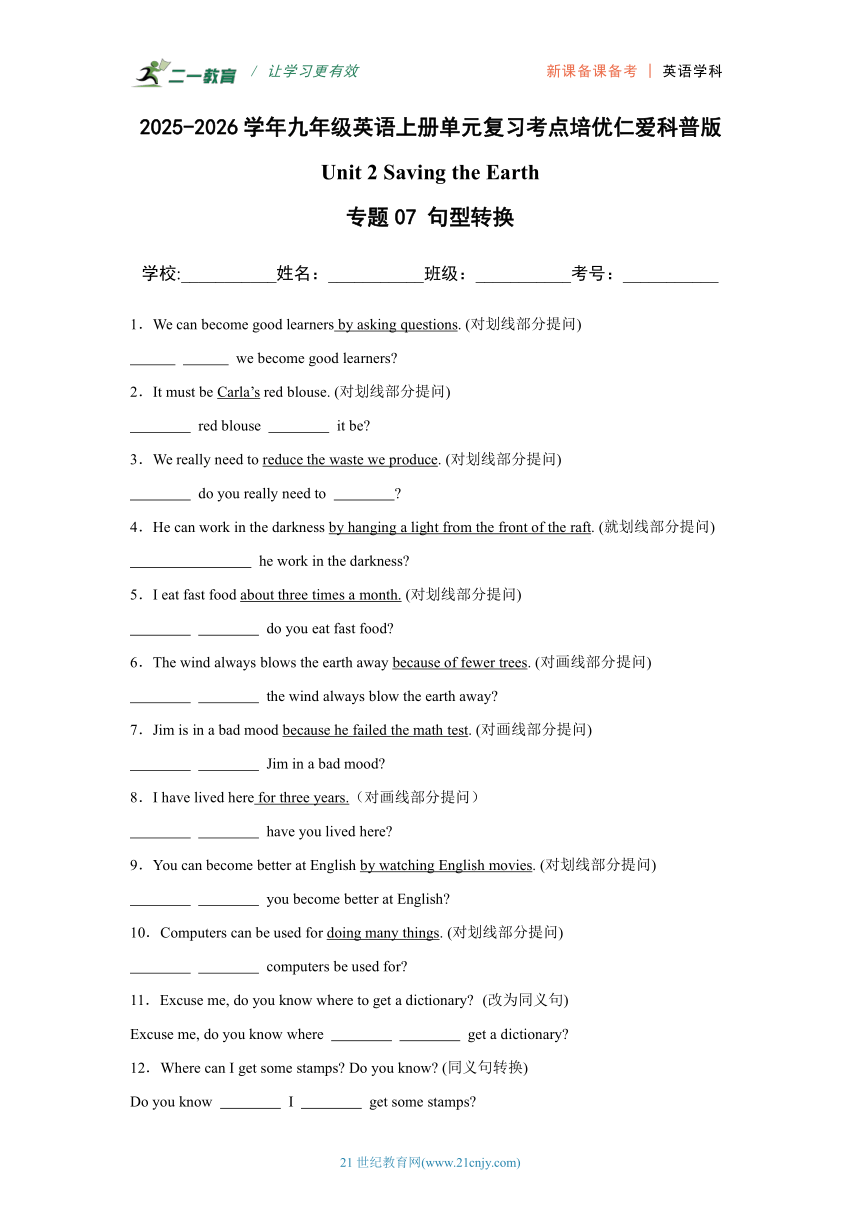
|
|
| 格式 | docx | ||
| 文件大小 | 53.5KB | ||
| 资源类型 | 试卷 | ||
| 版本资源 | 仁爱科普版 | ||
| 科目 | 英语 | ||
| 更新时间 | 2025-08-05 10:11:29 | ||
图片预览

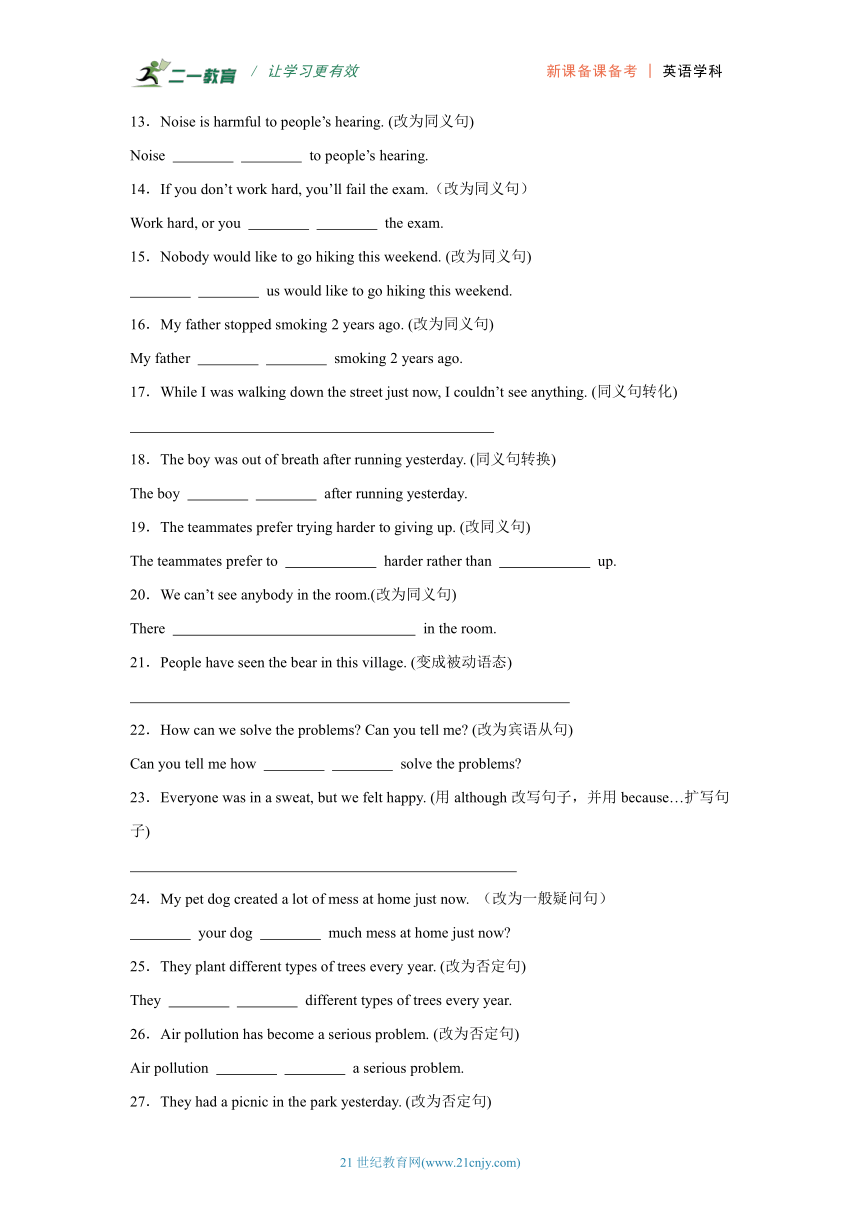
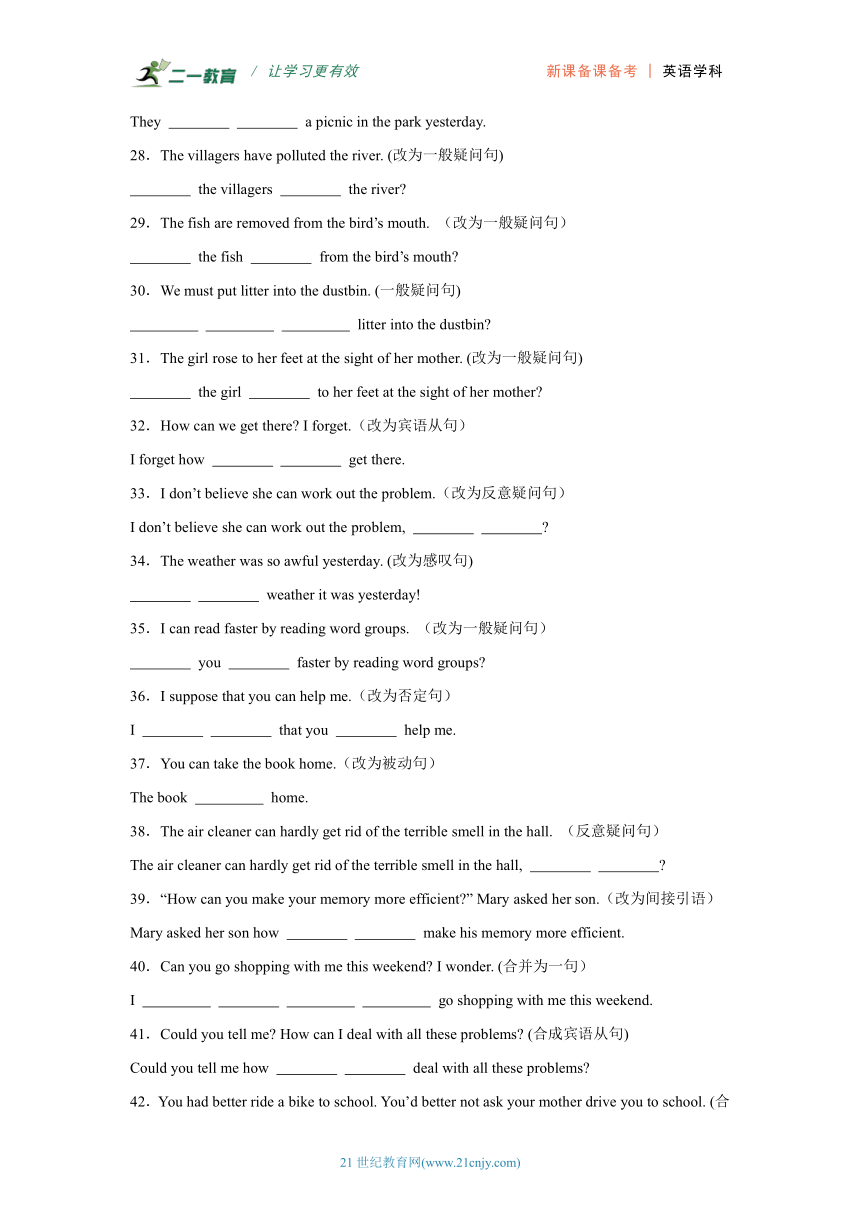
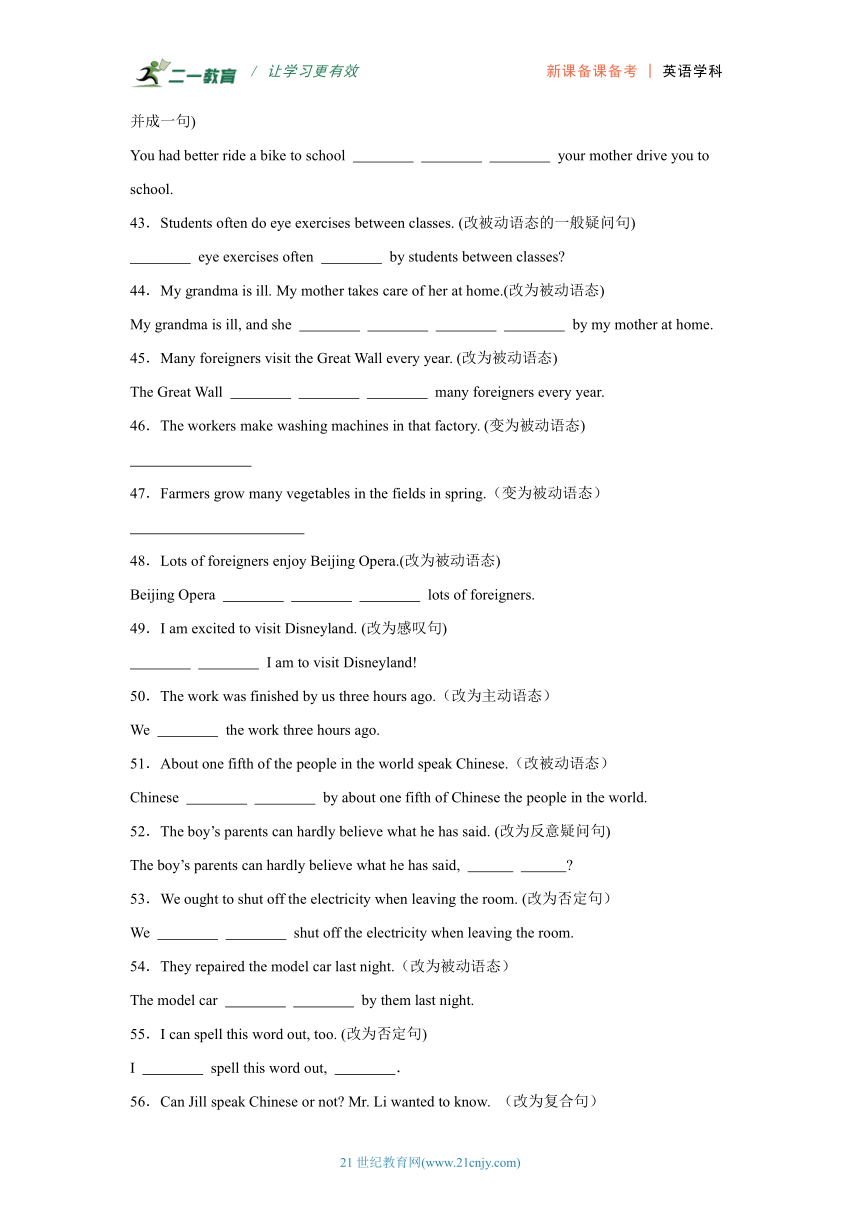
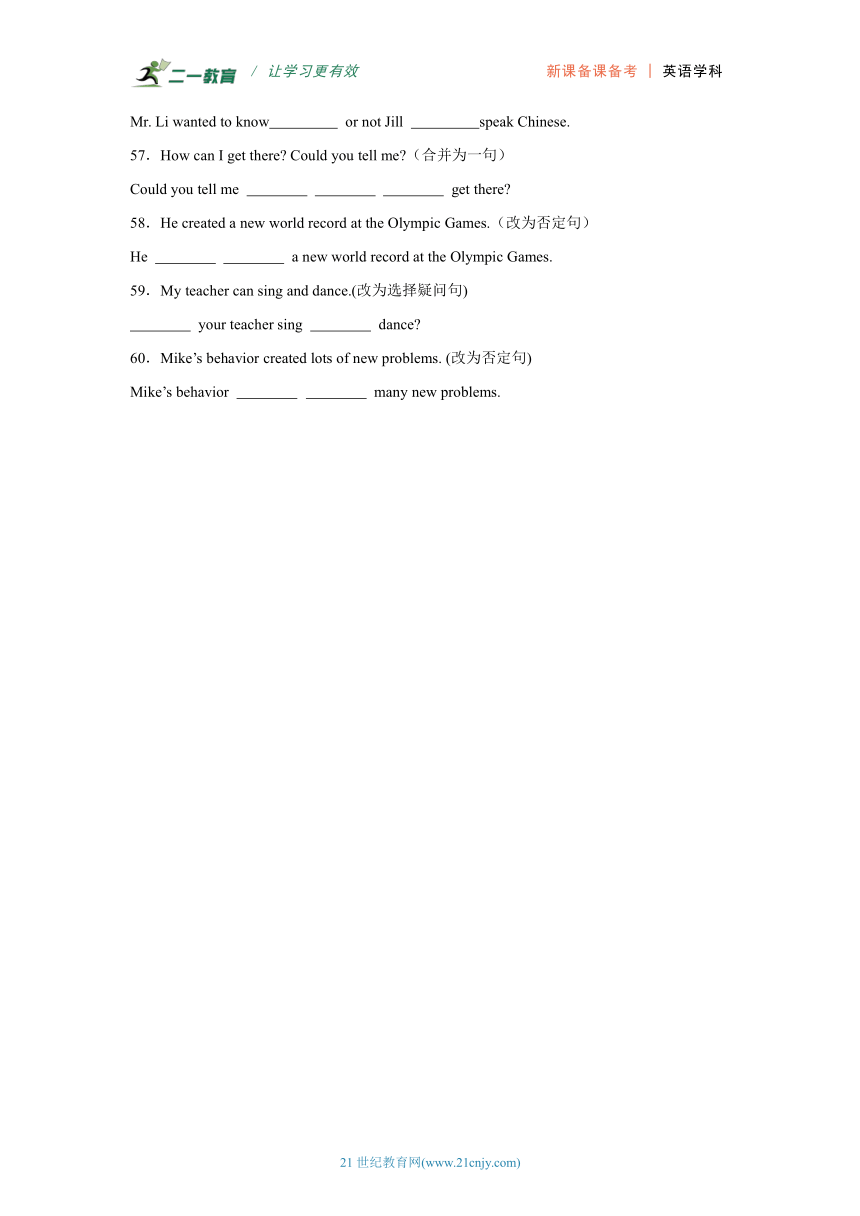
文档简介
/ 让学习更有效 新课备课备考 | 英语学科
/ 让学习更有效 新课备课备考 | 英语学科
2025-2026学年九年级英语上册单元复习考点培优仁爱科普版Unit 2 Saving the Earth
专题07 句型转换
学校:___________姓名:___________班级:___________考号:___________
1.We can become good learners by asking questions. (对划线部分提问)
we become good learners
2.It must be Carla’s red blouse. (对划线部分提问)
red blouse it be
3.We really need to reduce the waste we produce. (对划线部分提问)
do you really need to
4.He can work in the darkness by hanging a light from the front of the raft. (就划线部分提问)
he work in the darkness
5.I eat fast food about three times a month. (对划线部分提问)
do you eat fast food
6.The wind always blows the earth away because of fewer trees. (对画线部分提问)
the wind always blow the earth away
7.Jim is in a bad mood because he failed the math test. (对画线部分提问)
Jim in a bad mood
8.I have lived here for three years.(对画线部分提问)
have you lived here
9.You can become better at English by watching English movies. (对划线部分提问)
you become better at English
10.Computers can be used for doing many things. (对划线部分提问)
computers be used for
11.Excuse me, do you know where to get a dictionary (改为同义句)
Excuse me, do you know where get a dictionary
12.Where can I get some stamps Do you know (同义句转换)
Do you know I get some stamps
13.Noise is harmful to people’s hearing. (改为同义句)
Noise to people’s hearing.
14.If you don’t work hard, you’ll fail the exam.(改为同义句)
Work hard, or you the exam.
15.Nobody would like to go hiking this weekend. (改为同义句)
us would like to go hiking this weekend.
16.My father stopped smoking 2 years ago. (改为同义句)
My father smoking 2 years ago.
17.While I was walking down the street just now, I couldn’t see anything. (同义句转化)
18.The boy was out of breath after running yesterday. (同义句转换)
The boy after running yesterday.
19.The teammates prefer trying harder to giving up. (改同义句)
The teammates prefer to harder rather than up.
20.We can’t see anybody in the room.(改为同义句)
There in the room.
21.People have seen the bear in this village. (变成被动语态)
22.How can we solve the problems Can you tell me (改为宾语从句)
Can you tell me how solve the problems
23.Everyone was in a sweat, but we felt happy. (用although改写句子,并用because…扩写句子)
24.My pet dog created a lot of mess at home just now. (改为一般疑问句)
your dog much mess at home just now
25.They plant different types of trees every year. (改为否定句)
They different types of trees every year.
26.Air pollution has become a serious problem. (改为否定句)
Air pollution a serious problem.
27.They had a picnic in the park yesterday. (改为否定句)
They a picnic in the park yesterday.
28.The villagers have polluted the river. (改为一般疑问句)
the villagers the river
29.The fish are removed from the bird’s mouth. (改为一般疑问句)
the fish from the bird’s mouth
30.We must put litter into the dustbin. (一般疑问句)
litter into the dustbin
31.The girl rose to her feet at the sight of her mother. (改为一般疑问句)
the girl to her feet at the sight of her mother
32.How can we get there I forget.(改为宾语从句)
I forget how get there.
33.I don’t believe she can work out the problem.(改为反意疑问句)
I don’t believe she can work out the problem,
34.The weather was so awful yesterday. (改为感叹句)
weather it was yesterday!
35.I can read faster by reading word groups. (改为一般疑问句)
you faster by reading word groups
36.I suppose that you can help me.(改为否定句)
I that you help me.
37.You can take the book home.(改为被动句)
The book home.
38.The air cleaner can hardly get rid of the terrible smell in the hall. (反意疑问句)
The air cleaner can hardly get rid of the terrible smell in the hall,
39.“How can you make your memory more efficient ” Mary asked her son.(改为间接引语)
Mary asked her son how make his memory more efficient.
40.Can you go shopping with me this weekend I wonder. (合并为一句)
I go shopping with me this weekend.
41.Could you tell me How can I deal with all these problems (合成宾语从句)
Could you tell me how deal with all these problems
42.You had better ride a bike to school. You’d better not ask your mother drive you to school. (合并成一句)
You had better ride a bike to school your mother drive you to school.
43.Students often do eye exercises between classes. (改被动语态的一般疑问句)
eye exercises often by students between classes
44.My grandma is ill. My mother takes care of her at home.(改为被动语态)
My grandma is ill, and she by my mother at home.
45.Many foreigners visit the Great Wall every year. (改为被动语态)
The Great Wall many foreigners every year.
46.The workers make washing machines in that factory. (变为被动语态)
47.Farmers grow many vegetables in the fields in spring.(变为被动语态)
48.Lots of foreigners enjoy Beijing Opera.(改为被动语态)
Beijing Opera lots of foreigners.
49.I am excited to visit Disneyland. (改为感叹句)
I am to visit Disneyland!
50.The work was finished by us three hours ago.(改为主动语态)
We the work three hours ago.
51.About one fifth of the people in the world speak Chinese.(改被动语态)
Chinese by about one fifth of Chinese the people in the world.
52.The boy’s parents can hardly believe what he has said. (改为反意疑问句)
The boy’s parents can hardly believe what he has said,
53.We ought to shut off the electricity when leaving the room. (改为否定句)
We shut off the electricity when leaving the room.
54.They repaired the model car last night.(改为被动语态)
The model car by them last night.
55.I can spell this word out, too. (改为否定句)
I spell this word out, .
56.Can Jill speak Chinese or not Mr. Li wanted to know. (改为复合句)
Mr. Li wanted to know or not Jill speak Chinese.
57.How can I get there Could you tell me (合并为一句)
Could you tell me get there
58.He created a new world record at the Olympic Games.(改为否定句)
He a new world record at the Olympic Games.
59.My teacher can sing and dance.(改为选择疑问句)
your teacher sing dance
60.Mike’s behavior created lots of new problems. (改为否定句)
Mike’s behavior many new problems.
/ 让学习更有效 新课备课备考 | 英语学科
/ 让学习更有效 新课备课备考 | 英语学科
21世纪教育网(www.21cnjy.com)
21世纪教育网(www.21cnjy.com)
参考答案及试题解析
1.How can
【解析】句意:通过问问题,我们可以成为好的学习者。划线部分表示通过问问题,是一种方式,对此提问用疑问词how,疑问句将情态动词can提到疑问词后,故填How;can。
2.Whose can/could
【解析】句意:那一定是卡拉的红衬衫。划线部分表示“某人的”,需要用疑问词whose;must是表示有把握的肯定推测,在变为一般疑问句,可以借助情态动词can或could来表示“某物会是谁的”,故填Whose;can/could。
3.What reduce
【解析】句意:我们真的需要减少我们产生的垃圾。根据“We really need to reduce the waste we produce.”可知,提问后问句为“我们真的需要做什么”,用特殊疑问词what来引导疑问句,reduce“减少”,动词部分用原形。故填What;reduce。
4.How can
【解析】句意:在木筏前面挂一盏灯,他就可以在黑暗中工作。此处对方式方法进行提问,应用how引导特殊疑问句,句首首字母大写,原句含有情态动词can,改为特殊疑问句时,需将can放置疑问词后。故填How can。
5.How often
【解析】句意:我一个月大约吃三次快餐。划线部分“about three times a month”表示频率,应用how often作特殊疑问词,句首首字母要大写。故填How;often。
6.Why does
【解析】句意:风总是把土吹走,因为树木少了。画线部分“because of fewer trees”是土被风吹走的原因,用why“为什么”提问,谓语blows为实义动词,主语the wind前用助动词does。故填Why;does。
7.Why is
【解析】句意:吉姆心情不好,因为他数学考试不及格。根据划线部分“because he failed the math test”可知,此处应对原因进行提问,应用特殊疑问词why“为什么”;特殊疑问句的结构为“特殊疑问词+一般疑问句”,变一般疑问句,应将be动词“is”提至主语“Jim”前,其后部分保持不变;且句首首字母要大写。故填Why;is。
8.How long
【解析】句意:我在这里住了三年了。划线部分表示时间段,对此提问用how long“多长时间”,句首单词首字母大写。故填How;long。
9.How can
【解析】句意:你可以通过看英语电影来提高英语水平。划线部分表示方式,用how提问,后跟一般疑问句,情态动词can提到主语之前。故填How;can。
10.What can
【解析】句意:计算机可以用来做很多事情。此处对计算机的用途进行提问,用what引导特殊疑问句,句首首字母大写;原句中的情态动词can放置疑问词后。故选What;can。
11.I can
【解析】句意:打扰一下,你知道在哪里可以买到字典吗?原句中宾语从句“where to get a dictionary”可知,改写为“where I can get a dictionary”。故填I;can。
12.where can
【解析】句意:我在哪里可以得到一些邮票?你知道吗?合并为一句,可以表达为“你知道我可以在哪里买到邮票吗?”,用连接词where引导宾语从句,从句语序为陈述句语序,宾语从句主语为I,情态动词can置于主语后。故填where;can。
13.does harm
【解析】句意:噪音对人们的听力有害。此题是同义句转换,be harmful to something对……有害,同意结构为:do harm to something,对……有害,又根据is可知是一般现在时,主语Noise是不可数名词,因此do用does。故填does;harm。
14.will/won’t fail/pass
【解析】句意:如果你不努力学习,你会考不及格的。根据题干可知,同义句可表达为“努力学习,不然你会考试不及格/不会通过考试”;后半句时态应为一般将来时,will“会”,fail“不及格”;won’t“不会”;pass“通过”。故填will/won’t;fail/pass。
15.None of
【解析】句意:没有人想在这个周末去远足。Nobody“没有人”,可改为none of us“我们中没有一个”。故填None;of。
16.gave up
【解析】句意:我父亲两年前戒烟的。“戒烟”stop smoking,可以转化成give up smoking,give up“放弃”,且句子是一般过去时,动词用过去式gave。故填gave;up。
17.While I was walking down the street just now, I could see nothing.
【解析】句意:我刚才在街上走的时候,什么也看不见。not...anything=nothing“没有什么”,二者可以互换。故填While I was walking down the street just now, I could see nothing.
18.breathed heavily
【解析】句意:那男孩昨天跑完步后上气不接下气。根据“yesterday”可知该句是一般过去时,breathe“呼吸”,为谓语动词,应填过去式;修饰动词用heavily“沉重地”,指的呼吸沉重。故填breathed;heavily。
19.try give
【解析】句意:队友们宁愿更加努力也不愿放弃。宁愿做某事,也不愿做某事:prefer to do rather than do,故第一个空填try,第二个空填give。故填try;give。
20.is nobody
【解析】句意:我们在房间里看不到任何人。根据“We can’t see anybody in the room.”可知,房间里看不到任何人,说明房间里没有人,nobody“没有人”,主语是不定代词,改写后的句子为there be句型,be动词用单数is。故填is nobody。
21.The bear has been seen (by the people) in this village.
【解析】句意:人们在这个村子里见过熊。根据“have seen”可知原句为现在完成时,应改为现在完成时的被动语态,其谓语结构为:have/has been+过去分词。原句中的宾语the bear变成主语,助动词用has;把原句的主语用by构成的介词短语带出,也可不加;地点状语不变,位于句末。故填The bear has been seen (by the people) in this village.
22.we can
【解析】句意:我们如何解决这些问题?你能告诉我吗?原句是一个特殊疑问句,改为宾语从句时,需要将疑问句改为陈述句语序,因此把“can we”变成we can。故填we;can。
23.Although everyone was in a sweat, we all felt very happy because we had done a good job.
【解析】句意:尽管每个人都汗流浃背,但我们都感到很高兴,因为我们做得很好。根据“Everyone was in a sweat, but we felt happy.”可知,用although改写时需将although置于everyone之前,引导让步状语从句;用because扩写时需补充原因状语从句,说明高兴的原因是“做得很好”,符合原句中“虽然辛苦但内心满足”的逻辑。故填Although everyone was in a sweat, we all felt very happy because we had done a good job.
24.Did create
【解析】句意:我的宠物狗刚才把家里弄得一团糟。created是动词过去式,一般疑问句借助于助动词did,后面的动词用原形,故填Did;create。
25.don’t plant
【解析】句意:他们每年种植不同种类的树。原句中的“plant”为实义动词,一般现在时否定句需要用don’t,后接动词原形。故填don’t;plant。
26.hasn’t become
【解析】句意:空气污染已经成为了一个严重的问题。原句时态为现在完成时,结构为 “have/has+过去分词”,改为否定句时,句中助动词has改为否定形式hasn’t,过去分词become不变。故填hasn’t;become。
27.didn’t have
【解析】句意:他们昨天在公园野餐。改为否定句,had是实义动词,原句时态为一般过去时,所以否定句助动词用didn’t,其后加动词原形。故填didn’t;have。
28.Have polluted
【解析】句意:村民们污染了这条河。句子时态为现在完成时,其结构为“have/has done”,改为一般疑问句,应将助动词have提至主语“the villagers”前,其后部分保持不变,且句首首字母要大写。故填Have;polluted。
29.Are removed
【解析】句意:鱼从鸟嘴里取出来。原句含be动词,改为一般疑问句需将be动词提到句首并大写首字母,其后不变。故填Are;removed。
30.Must we put
【解析】句意:我们必须把垃圾放进垃圾箱。分析句子可知,句子要改为一般疑问句,应该将情态动词Must提到句首,首字母大写;其他保持不变,主语是we“我们”;put“放”,作谓语动词。故填Must;we;put。
31.Did rise
【解析】句意:女孩一看到母亲就站了起来。根据“rose”可知变疑问句时借助助动词did,后加动词原形rise。故填Did;rise。
32.we can
【解析】句意:怎么能到达那里?我忘记了。宾语从句的结构为“主语+谓语+引导词+从句”,根据题干,可知空缺处缺少“我们能”,用陈述语序,故填we;can。
33.can she
【解析】句意:我不相信她能解决这个问题。句子是宾语从句,主句结构是I don’t think...,此处疑问部分和从句保持一致,且此处是否定前移,故疑问句部分用肯定形式,用情态动词can,主语是she。故填can;she。
34.What awful
【解析】句意:昨天的天气真糟糕。改为感叹句修饰的中心词weather是不可数名词,用“what+形容词+不可数名词+主谓”的感叹句结构。故填What;awful。
35.Can read
【解析】句意:通过读词组,我可以读得更快。原句为含有情态动词can的陈述句,变一般疑问句时,can提前, 后跟动词原形。故填Can;read。
36.don’t suppose can
【解析】句意:我想你能帮助我。此句是宾语从句,当宾语从句的主句主语是第一人称,谓语动词是think/suppose/believe时,需要否定前移,也就是在主句上否定。主语是I,需要使用助动词don’t,后加动词原形suppose;第三空填can。故填don’t;suppose;can。
37.can be taken
【解析】句意:你可以把书带回家。结合can可知,本句是含有情态动词的被动语态,结构为can be done。take的过去分词为taken。故填can be taken。
38.can it
【解析】句意:空气净化器很难清除大厅里难闻的气味。反意疑问句遵循“前肯后否,前否后肯”原则;hardly是否定词,句子应用前否后肯;疑问部分主语用代词it来代替The air cleaner。故填can;it。
39.he could
【解析】句意:“你怎样才能让你的记忆力更高效?”玛丽问她儿子。根据“Mary asked her son how”可知,句子变为间接引语时,实际就是改为how引导的宾语从句,故从句要用陈述语序,根据“his”可知,从句主语应为he,此处主句是一般过去时,从句也要要用一般过去时,can的过去式为could。故填he;could。
40.wonder whether you can
【解析】句意:你这周末能和我一起去购物吗?我想知道。空格处把一般疑问句Can you go shopping with me this weekend 改写为动词wonder的宾语从句,故用whether引导,同时“I”要变成“you”。故填wonder;whether; you; can。
41.I can
【解析】句意:你能告诉我吗?我该如何处理这些问题?“How can I deal with all these problems ”是特殊疑问句,根据宾语从句要用陈述句语序,应变为“How I can deal with all these problems”。故填I;can。
42.instead of asking
【解析】句意:你最好骑自行车去学校。你最好不要求你的妈妈开车带你去学校。
根据两个句子的句意可知,“你最好是骑自行车去学校,而不是让妈妈开车带你去学校”。 句中“是……而不是……”,用instead of doing sth.来表达。故填instead;of;asking。
43.Are done
【解析】句意:学生们经常在课间做眼保健操。根据“do”可知,时态是一般现在时,改为被动语态的一般疑问句,主语eye exercises是复数,故将be动词are提前,置于句首,首字母大写,动词do用其过去分词形式。故填Are;done。
44.is taken care of
【解析】句意:我奶奶病了。我妈妈在家照顾她。原句改为被动语态,即奶奶被妈妈照顾,结构是be done。根据“takes”可知,时态是一般现在时,主语she是第三人称单数,故用be动词is,take用其过去分词形式。故填is;taken;care;of。
45.is visited by
【解析】句意:每年都有许多外国人参观长城。被动语态的句子主语为“the Great Wall”,和谓语动词visit为被动关系,原句为一般现在时,应用一般现在时的被动语态“is/are done”,主语为单数,助动词用is,by后强调动作或行为的发出者,表示“被……”。故填is;visited;by。
46.Washing machines are made by the workers in that factory.
【解析】句意:这些工人们在工厂制造洗衣机。原句时态为一般现在时,所以改写后的句子使用一般现在时的被动语态(be done),将原来句子的宾语“washing machines”作为主语,主语是复数,因此be动词用“are”,动词“make”变为过去分词“made”;原句的主语“the workers”变为“by the workers”;地点状语“in that factory”不变,位于句末。故填Washing machines are made by the workers in that factory.
47.Many vegetables are grown by farmers in the fields in spring.
【解析】句意:农民们春天在地里种了许多蔬菜。根据“Farmers”和“many vegetables”可知,变被动句时,原句的主语和宾语交换位置,宾语前加by,故“many vegetables”作主语,many的首字母m要大写,“Farmers”作宾语,首字母F要小写,其前加by,根据“grow”可知,被动语态句子中,谓语动词为“be+过去分词”,由“many vegetables”和“grow”可知,句子主语为复数,且时态为一般现在时,故应用be动词中的are,grow的过去分词为grown,句子余下结构照抄下来。故填Many vegetables are grown by farmers in the fields in spring。
48.is enjoyed by
【解析】句意:许多外国人喜欢京剧。原句改为被动语态,即“京剧被许多外国人喜欢”。本句是一般现在时,被动语态结构为be done,主语是第三人称单数,故用is,enjoy用其过去分词形式;by“被”。故填is;enjoyed;by。
49.How excited
【解析】句意:我很高兴能参观迪斯尼乐园。改为感叹句,excited“感到兴奋的”是形容词,应用how修饰,结构是How adj.+主谓!。故填How;excited。
50.finished
【解析】句意:这工作我们三个小时前就完成了。根据“was finished”可知,句子为一般过去时,故变主动语态时,谓语动词应用finish的过去式finished。故填finished。
51.is spoken
【解析】句意:世界上大约五分之一的人说汉语。根据“speak”可知,句子为一般现在时,变被动语态时,谓语动词应用“be done”的结构,根据“Chinese”可知,句子主语为第三人称单数形式,故be动词应用is,speak的过去分词形式为spoken。故填is;spoken。
52.can they
【解析】句意:男孩的父母几乎不能相信他所说的话。反意疑问句构成有两种形式:(1)前肯后否;(2)前否后肯。本句前句是否定句(句中有hardly),后面应用肯定的简短一般疑问句,此句含有情态动词can,改为一般疑问句把情态动词提前,they指代“The boy’s parents”。故填can; they。
53.oughtn’t
to
【解析】句意:我们离开房间时应该把电源切断。否定句一般在be动词或者情态动词的后面加not,此处ought to表示“应该”,作情态动词使用,所以在ought后加not,故填oughtn’t to。
54.was repaired
【解析】句意:他们昨晚修理了模型汽车。原句为一般过去时态,改为被动语态时,主语为“The model car”,是第三人称单数,故be用was,repaired为过去分词。故填was;repaired。
55.can’t either
【解析】句意:这个词我也能拼出来。根据题意是变成否定句,含有情态动词can的否定句,直接在can的后面加not,too用在肯定句中的句尾,变成否定句要变成either。故填can’t;either。
56.whether could
【解析】句意:李先生想知道吉尔是否会说汉语。考查简单句变复合句。“是否”用“whether or not”故第一空填whether。“能”用“can”,因为前面句子是一般过去时,故第二空用“can”的一般过去时could。
57.how I can
【解析】句意:我怎么去那里?你能告诉我吗?合为一句可以用how引导的宾语从句。宾语从句用陈述语序:连接词+主语+谓语。I“我”,作主语;can“能”。故填how;I;can。
58.didn’t creat
【解析】句意:他在奥运会上创造了新的世界纪录。原句时态为一般过去时,且含有实义动词“created”,改为否定句时要用助动词didn’t,后接动词原形create。故填didn’t;create。
59.Can or
【解析】句意:我的老师会唱歌和跳舞。题目要求改成选择疑问句,把情态动词can提到句首,“and”在疑问句中改为“or”表选择。故填Can;or。
60.didn’t create
【解析】句意:Mike的行为制造了许多新问题。根据“create”是实义动词,所以变否定句时用助动词,时态是一般过去时,所以用助动词didn’t,后面接动词原形,created变成原形create,故填didn’t;create。
21世纪教育网(www.21cnjy.com)
21世纪教育网(www.21cnjy.com)
/ 让学习更有效 新课备课备考 | 英语学科
2025-2026学年九年级英语上册单元复习考点培优仁爱科普版Unit 2 Saving the Earth
专题07 句型转换
学校:___________姓名:___________班级:___________考号:___________
1.We can become good learners by asking questions. (对划线部分提问)
we become good learners
2.It must be Carla’s red blouse. (对划线部分提问)
red blouse it be
3.We really need to reduce the waste we produce. (对划线部分提问)
do you really need to
4.He can work in the darkness by hanging a light from the front of the raft. (就划线部分提问)
he work in the darkness
5.I eat fast food about three times a month. (对划线部分提问)
do you eat fast food
6.The wind always blows the earth away because of fewer trees. (对画线部分提问)
the wind always blow the earth away
7.Jim is in a bad mood because he failed the math test. (对画线部分提问)
Jim in a bad mood
8.I have lived here for three years.(对画线部分提问)
have you lived here
9.You can become better at English by watching English movies. (对划线部分提问)
you become better at English
10.Computers can be used for doing many things. (对划线部分提问)
computers be used for
11.Excuse me, do you know where to get a dictionary (改为同义句)
Excuse me, do you know where get a dictionary
12.Where can I get some stamps Do you know (同义句转换)
Do you know I get some stamps
13.Noise is harmful to people’s hearing. (改为同义句)
Noise to people’s hearing.
14.If you don’t work hard, you’ll fail the exam.(改为同义句)
Work hard, or you the exam.
15.Nobody would like to go hiking this weekend. (改为同义句)
us would like to go hiking this weekend.
16.My father stopped smoking 2 years ago. (改为同义句)
My father smoking 2 years ago.
17.While I was walking down the street just now, I couldn’t see anything. (同义句转化)
18.The boy was out of breath after running yesterday. (同义句转换)
The boy after running yesterday.
19.The teammates prefer trying harder to giving up. (改同义句)
The teammates prefer to harder rather than up.
20.We can’t see anybody in the room.(改为同义句)
There in the room.
21.People have seen the bear in this village. (变成被动语态)
22.How can we solve the problems Can you tell me (改为宾语从句)
Can you tell me how solve the problems
23.Everyone was in a sweat, but we felt happy. (用although改写句子,并用because…扩写句子)
24.My pet dog created a lot of mess at home just now. (改为一般疑问句)
your dog much mess at home just now
25.They plant different types of trees every year. (改为否定句)
They different types of trees every year.
26.Air pollution has become a serious problem. (改为否定句)
Air pollution a serious problem.
27.They had a picnic in the park yesterday. (改为否定句)
They a picnic in the park yesterday.
28.The villagers have polluted the river. (改为一般疑问句)
the villagers the river
29.The fish are removed from the bird’s mouth. (改为一般疑问句)
the fish from the bird’s mouth
30.We must put litter into the dustbin. (一般疑问句)
litter into the dustbin
31.The girl rose to her feet at the sight of her mother. (改为一般疑问句)
the girl to her feet at the sight of her mother
32.How can we get there I forget.(改为宾语从句)
I forget how get there.
33.I don’t believe she can work out the problem.(改为反意疑问句)
I don’t believe she can work out the problem,
34.The weather was so awful yesterday. (改为感叹句)
weather it was yesterday!
35.I can read faster by reading word groups. (改为一般疑问句)
you faster by reading word groups
36.I suppose that you can help me.(改为否定句)
I that you help me.
37.You can take the book home.(改为被动句)
The book home.
38.The air cleaner can hardly get rid of the terrible smell in the hall. (反意疑问句)
The air cleaner can hardly get rid of the terrible smell in the hall,
39.“How can you make your memory more efficient ” Mary asked her son.(改为间接引语)
Mary asked her son how make his memory more efficient.
40.Can you go shopping with me this weekend I wonder. (合并为一句)
I go shopping with me this weekend.
41.Could you tell me How can I deal with all these problems (合成宾语从句)
Could you tell me how deal with all these problems
42.You had better ride a bike to school. You’d better not ask your mother drive you to school. (合并成一句)
You had better ride a bike to school your mother drive you to school.
43.Students often do eye exercises between classes. (改被动语态的一般疑问句)
eye exercises often by students between classes
44.My grandma is ill. My mother takes care of her at home.(改为被动语态)
My grandma is ill, and she by my mother at home.
45.Many foreigners visit the Great Wall every year. (改为被动语态)
The Great Wall many foreigners every year.
46.The workers make washing machines in that factory. (变为被动语态)
47.Farmers grow many vegetables in the fields in spring.(变为被动语态)
48.Lots of foreigners enjoy Beijing Opera.(改为被动语态)
Beijing Opera lots of foreigners.
49.I am excited to visit Disneyland. (改为感叹句)
I am to visit Disneyland!
50.The work was finished by us three hours ago.(改为主动语态)
We the work three hours ago.
51.About one fifth of the people in the world speak Chinese.(改被动语态)
Chinese by about one fifth of Chinese the people in the world.
52.The boy’s parents can hardly believe what he has said. (改为反意疑问句)
The boy’s parents can hardly believe what he has said,
53.We ought to shut off the electricity when leaving the room. (改为否定句)
We shut off the electricity when leaving the room.
54.They repaired the model car last night.(改为被动语态)
The model car by them last night.
55.I can spell this word out, too. (改为否定句)
I spell this word out, .
56.Can Jill speak Chinese or not Mr. Li wanted to know. (改为复合句)
Mr. Li wanted to know or not Jill speak Chinese.
57.How can I get there Could you tell me (合并为一句)
Could you tell me get there
58.He created a new world record at the Olympic Games.(改为否定句)
He a new world record at the Olympic Games.
59.My teacher can sing and dance.(改为选择疑问句)
your teacher sing dance
60.Mike’s behavior created lots of new problems. (改为否定句)
Mike’s behavior many new problems.
/ 让学习更有效 新课备课备考 | 英语学科
/ 让学习更有效 新课备课备考 | 英语学科
21世纪教育网(www.21cnjy.com)
21世纪教育网(www.21cnjy.com)
参考答案及试题解析
1.How can
【解析】句意:通过问问题,我们可以成为好的学习者。划线部分表示通过问问题,是一种方式,对此提问用疑问词how,疑问句将情态动词can提到疑问词后,故填How;can。
2.Whose can/could
【解析】句意:那一定是卡拉的红衬衫。划线部分表示“某人的”,需要用疑问词whose;must是表示有把握的肯定推测,在变为一般疑问句,可以借助情态动词can或could来表示“某物会是谁的”,故填Whose;can/could。
3.What reduce
【解析】句意:我们真的需要减少我们产生的垃圾。根据“We really need to reduce the waste we produce.”可知,提问后问句为“我们真的需要做什么”,用特殊疑问词what来引导疑问句,reduce“减少”,动词部分用原形。故填What;reduce。
4.How can
【解析】句意:在木筏前面挂一盏灯,他就可以在黑暗中工作。此处对方式方法进行提问,应用how引导特殊疑问句,句首首字母大写,原句含有情态动词can,改为特殊疑问句时,需将can放置疑问词后。故填How can。
5.How often
【解析】句意:我一个月大约吃三次快餐。划线部分“about three times a month”表示频率,应用how often作特殊疑问词,句首首字母要大写。故填How;often。
6.Why does
【解析】句意:风总是把土吹走,因为树木少了。画线部分“because of fewer trees”是土被风吹走的原因,用why“为什么”提问,谓语blows为实义动词,主语the wind前用助动词does。故填Why;does。
7.Why is
【解析】句意:吉姆心情不好,因为他数学考试不及格。根据划线部分“because he failed the math test”可知,此处应对原因进行提问,应用特殊疑问词why“为什么”;特殊疑问句的结构为“特殊疑问词+一般疑问句”,变一般疑问句,应将be动词“is”提至主语“Jim”前,其后部分保持不变;且句首首字母要大写。故填Why;is。
8.How long
【解析】句意:我在这里住了三年了。划线部分表示时间段,对此提问用how long“多长时间”,句首单词首字母大写。故填How;long。
9.How can
【解析】句意:你可以通过看英语电影来提高英语水平。划线部分表示方式,用how提问,后跟一般疑问句,情态动词can提到主语之前。故填How;can。
10.What can
【解析】句意:计算机可以用来做很多事情。此处对计算机的用途进行提问,用what引导特殊疑问句,句首首字母大写;原句中的情态动词can放置疑问词后。故选What;can。
11.I can
【解析】句意:打扰一下,你知道在哪里可以买到字典吗?原句中宾语从句“where to get a dictionary”可知,改写为“where I can get a dictionary”。故填I;can。
12.where can
【解析】句意:我在哪里可以得到一些邮票?你知道吗?合并为一句,可以表达为“你知道我可以在哪里买到邮票吗?”,用连接词where引导宾语从句,从句语序为陈述句语序,宾语从句主语为I,情态动词can置于主语后。故填where;can。
13.does harm
【解析】句意:噪音对人们的听力有害。此题是同义句转换,be harmful to something对……有害,同意结构为:do harm to something,对……有害,又根据is可知是一般现在时,主语Noise是不可数名词,因此do用does。故填does;harm。
14.will/won’t fail/pass
【解析】句意:如果你不努力学习,你会考不及格的。根据题干可知,同义句可表达为“努力学习,不然你会考试不及格/不会通过考试”;后半句时态应为一般将来时,will“会”,fail“不及格”;won’t“不会”;pass“通过”。故填will/won’t;fail/pass。
15.None of
【解析】句意:没有人想在这个周末去远足。Nobody“没有人”,可改为none of us“我们中没有一个”。故填None;of。
16.gave up
【解析】句意:我父亲两年前戒烟的。“戒烟”stop smoking,可以转化成give up smoking,give up“放弃”,且句子是一般过去时,动词用过去式gave。故填gave;up。
17.While I was walking down the street just now, I could see nothing.
【解析】句意:我刚才在街上走的时候,什么也看不见。not...anything=nothing“没有什么”,二者可以互换。故填While I was walking down the street just now, I could see nothing.
18.breathed heavily
【解析】句意:那男孩昨天跑完步后上气不接下气。根据“yesterday”可知该句是一般过去时,breathe“呼吸”,为谓语动词,应填过去式;修饰动词用heavily“沉重地”,指的呼吸沉重。故填breathed;heavily。
19.try give
【解析】句意:队友们宁愿更加努力也不愿放弃。宁愿做某事,也不愿做某事:prefer to do rather than do,故第一个空填try,第二个空填give。故填try;give。
20.is nobody
【解析】句意:我们在房间里看不到任何人。根据“We can’t see anybody in the room.”可知,房间里看不到任何人,说明房间里没有人,nobody“没有人”,主语是不定代词,改写后的句子为there be句型,be动词用单数is。故填is nobody。
21.The bear has been seen (by the people) in this village.
【解析】句意:人们在这个村子里见过熊。根据“have seen”可知原句为现在完成时,应改为现在完成时的被动语态,其谓语结构为:have/has been+过去分词。原句中的宾语the bear变成主语,助动词用has;把原句的主语用by构成的介词短语带出,也可不加;地点状语不变,位于句末。故填The bear has been seen (by the people) in this village.
22.we can
【解析】句意:我们如何解决这些问题?你能告诉我吗?原句是一个特殊疑问句,改为宾语从句时,需要将疑问句改为陈述句语序,因此把“can we”变成we can。故填we;can。
23.Although everyone was in a sweat, we all felt very happy because we had done a good job.
【解析】句意:尽管每个人都汗流浃背,但我们都感到很高兴,因为我们做得很好。根据“Everyone was in a sweat, but we felt happy.”可知,用although改写时需将although置于everyone之前,引导让步状语从句;用because扩写时需补充原因状语从句,说明高兴的原因是“做得很好”,符合原句中“虽然辛苦但内心满足”的逻辑。故填Although everyone was in a sweat, we all felt very happy because we had done a good job.
24.Did create
【解析】句意:我的宠物狗刚才把家里弄得一团糟。created是动词过去式,一般疑问句借助于助动词did,后面的动词用原形,故填Did;create。
25.don’t plant
【解析】句意:他们每年种植不同种类的树。原句中的“plant”为实义动词,一般现在时否定句需要用don’t,后接动词原形。故填don’t;plant。
26.hasn’t become
【解析】句意:空气污染已经成为了一个严重的问题。原句时态为现在完成时,结构为 “have/has+过去分词”,改为否定句时,句中助动词has改为否定形式hasn’t,过去分词become不变。故填hasn’t;become。
27.didn’t have
【解析】句意:他们昨天在公园野餐。改为否定句,had是实义动词,原句时态为一般过去时,所以否定句助动词用didn’t,其后加动词原形。故填didn’t;have。
28.Have polluted
【解析】句意:村民们污染了这条河。句子时态为现在完成时,其结构为“have/has done”,改为一般疑问句,应将助动词have提至主语“the villagers”前,其后部分保持不变,且句首首字母要大写。故填Have;polluted。
29.Are removed
【解析】句意:鱼从鸟嘴里取出来。原句含be动词,改为一般疑问句需将be动词提到句首并大写首字母,其后不变。故填Are;removed。
30.Must we put
【解析】句意:我们必须把垃圾放进垃圾箱。分析句子可知,句子要改为一般疑问句,应该将情态动词Must提到句首,首字母大写;其他保持不变,主语是we“我们”;put“放”,作谓语动词。故填Must;we;put。
31.Did rise
【解析】句意:女孩一看到母亲就站了起来。根据“rose”可知变疑问句时借助助动词did,后加动词原形rise。故填Did;rise。
32.we can
【解析】句意:怎么能到达那里?我忘记了。宾语从句的结构为“主语+谓语+引导词+从句”,根据题干,可知空缺处缺少“我们能”,用陈述语序,故填we;can。
33.can she
【解析】句意:我不相信她能解决这个问题。句子是宾语从句,主句结构是I don’t think...,此处疑问部分和从句保持一致,且此处是否定前移,故疑问句部分用肯定形式,用情态动词can,主语是she。故填can;she。
34.What awful
【解析】句意:昨天的天气真糟糕。改为感叹句修饰的中心词weather是不可数名词,用“what+形容词+不可数名词+主谓”的感叹句结构。故填What;awful。
35.Can read
【解析】句意:通过读词组,我可以读得更快。原句为含有情态动词can的陈述句,变一般疑问句时,can提前, 后跟动词原形。故填Can;read。
36.don’t suppose can
【解析】句意:我想你能帮助我。此句是宾语从句,当宾语从句的主句主语是第一人称,谓语动词是think/suppose/believe时,需要否定前移,也就是在主句上否定。主语是I,需要使用助动词don’t,后加动词原形suppose;第三空填can。故填don’t;suppose;can。
37.can be taken
【解析】句意:你可以把书带回家。结合can可知,本句是含有情态动词的被动语态,结构为can be done。take的过去分词为taken。故填can be taken。
38.can it
【解析】句意:空气净化器很难清除大厅里难闻的气味。反意疑问句遵循“前肯后否,前否后肯”原则;hardly是否定词,句子应用前否后肯;疑问部分主语用代词it来代替The air cleaner。故填can;it。
39.he could
【解析】句意:“你怎样才能让你的记忆力更高效?”玛丽问她儿子。根据“Mary asked her son how”可知,句子变为间接引语时,实际就是改为how引导的宾语从句,故从句要用陈述语序,根据“his”可知,从句主语应为he,此处主句是一般过去时,从句也要要用一般过去时,can的过去式为could。故填he;could。
40.wonder whether you can
【解析】句意:你这周末能和我一起去购物吗?我想知道。空格处把一般疑问句Can you go shopping with me this weekend 改写为动词wonder的宾语从句,故用whether引导,同时“I”要变成“you”。故填wonder;whether; you; can。
41.I can
【解析】句意:你能告诉我吗?我该如何处理这些问题?“How can I deal with all these problems ”是特殊疑问句,根据宾语从句要用陈述句语序,应变为“How I can deal with all these problems”。故填I;can。
42.instead of asking
【解析】句意:你最好骑自行车去学校。你最好不要求你的妈妈开车带你去学校。
根据两个句子的句意可知,“你最好是骑自行车去学校,而不是让妈妈开车带你去学校”。 句中“是……而不是……”,用instead of doing sth.来表达。故填instead;of;asking。
43.Are done
【解析】句意:学生们经常在课间做眼保健操。根据“do”可知,时态是一般现在时,改为被动语态的一般疑问句,主语eye exercises是复数,故将be动词are提前,置于句首,首字母大写,动词do用其过去分词形式。故填Are;done。
44.is taken care of
【解析】句意:我奶奶病了。我妈妈在家照顾她。原句改为被动语态,即奶奶被妈妈照顾,结构是be done。根据“takes”可知,时态是一般现在时,主语she是第三人称单数,故用be动词is,take用其过去分词形式。故填is;taken;care;of。
45.is visited by
【解析】句意:每年都有许多外国人参观长城。被动语态的句子主语为“the Great Wall”,和谓语动词visit为被动关系,原句为一般现在时,应用一般现在时的被动语态“is/are done”,主语为单数,助动词用is,by后强调动作或行为的发出者,表示“被……”。故填is;visited;by。
46.Washing machines are made by the workers in that factory.
【解析】句意:这些工人们在工厂制造洗衣机。原句时态为一般现在时,所以改写后的句子使用一般现在时的被动语态(be done),将原来句子的宾语“washing machines”作为主语,主语是复数,因此be动词用“are”,动词“make”变为过去分词“made”;原句的主语“the workers”变为“by the workers”;地点状语“in that factory”不变,位于句末。故填Washing machines are made by the workers in that factory.
47.Many vegetables are grown by farmers in the fields in spring.
【解析】句意:农民们春天在地里种了许多蔬菜。根据“Farmers”和“many vegetables”可知,变被动句时,原句的主语和宾语交换位置,宾语前加by,故“many vegetables”作主语,many的首字母m要大写,“Farmers”作宾语,首字母F要小写,其前加by,根据“grow”可知,被动语态句子中,谓语动词为“be+过去分词”,由“many vegetables”和“grow”可知,句子主语为复数,且时态为一般现在时,故应用be动词中的are,grow的过去分词为grown,句子余下结构照抄下来。故填Many vegetables are grown by farmers in the fields in spring。
48.is enjoyed by
【解析】句意:许多外国人喜欢京剧。原句改为被动语态,即“京剧被许多外国人喜欢”。本句是一般现在时,被动语态结构为be done,主语是第三人称单数,故用is,enjoy用其过去分词形式;by“被”。故填is;enjoyed;by。
49.How excited
【解析】句意:我很高兴能参观迪斯尼乐园。改为感叹句,excited“感到兴奋的”是形容词,应用how修饰,结构是How adj.+主谓!。故填How;excited。
50.finished
【解析】句意:这工作我们三个小时前就完成了。根据“was finished”可知,句子为一般过去时,故变主动语态时,谓语动词应用finish的过去式finished。故填finished。
51.is spoken
【解析】句意:世界上大约五分之一的人说汉语。根据“speak”可知,句子为一般现在时,变被动语态时,谓语动词应用“be done”的结构,根据“Chinese”可知,句子主语为第三人称单数形式,故be动词应用is,speak的过去分词形式为spoken。故填is;spoken。
52.can they
【解析】句意:男孩的父母几乎不能相信他所说的话。反意疑问句构成有两种形式:(1)前肯后否;(2)前否后肯。本句前句是否定句(句中有hardly),后面应用肯定的简短一般疑问句,此句含有情态动词can,改为一般疑问句把情态动词提前,they指代“The boy’s parents”。故填can; they。
53.oughtn’t
to
【解析】句意:我们离开房间时应该把电源切断。否定句一般在be动词或者情态动词的后面加not,此处ought to表示“应该”,作情态动词使用,所以在ought后加not,故填oughtn’t to。
54.was repaired
【解析】句意:他们昨晚修理了模型汽车。原句为一般过去时态,改为被动语态时,主语为“The model car”,是第三人称单数,故be用was,repaired为过去分词。故填was;repaired。
55.can’t either
【解析】句意:这个词我也能拼出来。根据题意是变成否定句,含有情态动词can的否定句,直接在can的后面加not,too用在肯定句中的句尾,变成否定句要变成either。故填can’t;either。
56.whether could
【解析】句意:李先生想知道吉尔是否会说汉语。考查简单句变复合句。“是否”用“whether or not”故第一空填whether。“能”用“can”,因为前面句子是一般过去时,故第二空用“can”的一般过去时could。
57.how I can
【解析】句意:我怎么去那里?你能告诉我吗?合为一句可以用how引导的宾语从句。宾语从句用陈述语序:连接词+主语+谓语。I“我”,作主语;can“能”。故填how;I;can。
58.didn’t creat
【解析】句意:他在奥运会上创造了新的世界纪录。原句时态为一般过去时,且含有实义动词“created”,改为否定句时要用助动词didn’t,后接动词原形create。故填didn’t;create。
59.Can or
【解析】句意:我的老师会唱歌和跳舞。题目要求改成选择疑问句,把情态动词can提到句首,“and”在疑问句中改为“or”表选择。故填Can;or。
60.didn’t create
【解析】句意:Mike的行为制造了许多新问题。根据“create”是实义动词,所以变否定句时用助动词,时态是一般过去时,所以用助动词didn’t,后面接动词原形,created变成原形create,故填didn’t;create。
21世纪教育网(www.21cnjy.com)
21世纪教育网(www.21cnjy.com)
同课章节目录
- Unit 1 The Changing World
- Topic 1 Our country has developed rapidly.
- Topic 2 The population in developing countries is
- Topic 3 The world has changed for the better.
- Unit 2 Saving the earth.
- Topic 1 Pollution has causes too many problems.
- Topic 2 All these problems are very serious.
- Topic 3 What can we do to protect the environment
- Unit 3 English around the World
- Topic 1 English is widely spoken around the world.
- Topic 2 Some things usually have different meaning
- Topic 3 Could you give us some advice on how to l
- Unit 4 Amazing Science
- Topic 1 When was it invented?
- Topic 2 I'm excited about the things that will be
- Topic 3 China is the third nation that sent a pers
